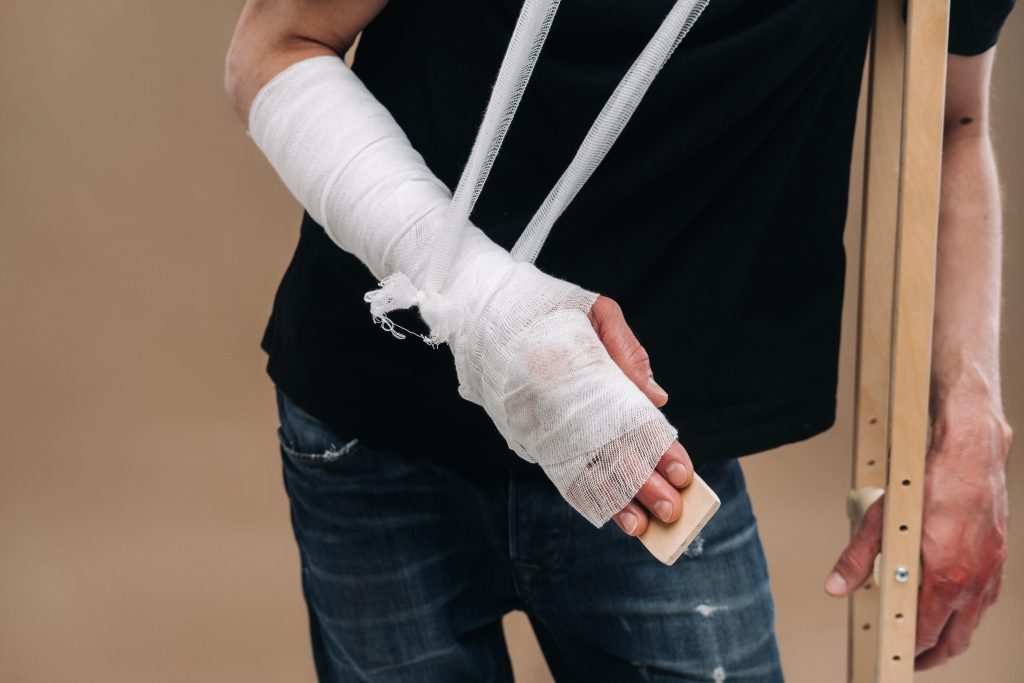Are you a victim of a personal injury in Dallas? Navigating the legal process can feel like wading through a maze. But fear not, we are here to guide you towards a successful personal injury claim.
Filing a personal injury claim requires thorough understanding of Dallas law and a strategic approach. In this article, we will walk you through the essential steps, from gathering evidence to seeking legal representation, all with the aim of helping you win your case.
Our team of legal experts has extensive experience in personal injury cases in Dallas. We understand the complexities involved and the importance of building a strong case. With our guidance, you’ll be able to navigate the legal maze confidently, armed with the knowledge and tools needed to secure the compensation you deserve.
Don’t let the daunting legal process overwhelm you. With our comprehensive guide, you’ll have the knowledge and resources to ensure a successful personal injury claim. So, let’s dive in and explore the steps you need to take to win your case in Dallas.
Personal injury claims arise when an individual suffers harm due to the negligence or intentional acts of another party. In Dallas, as in other jurisdictions, personal injury law allows victims to seek compensation for their injuries, medical expenses, pain and suffering, and other damages.
To file a successful personal injury claim, it is essential to understand the various types of personal injury cases and the specific laws that apply to each. Personal injury cases can range from car accidents and slip and falls to medical malpractice and product liability. Each case requires a unique approach and a thorough understanding of the legal principles involved.

Personal injury cases cover a wide range of accidents and incidents that result in harm. Some common types of personal injury cases in Dallas include:
1. Car Accidents: Accidents involving cars, motorcycles, or trucks are among the most common personal injury cases. These accidents can result in severe injuries, including broken bones, spinal cord injuries, and traumatic brain injuries.
2. Slip and Falls: Slip and fall accidents can occur on someone else’s property due to hazardous conditions, such as wet floors, uneven surfaces, or inadequate lighting. Property owners have a duty to maintain safe premises, and if they fail to do so, they may be held liable for any resulting injuries.
3. Medical Malpractice: Medical malpractice occurs when a healthcare professional’s negligence leads to injury or death. Examples include misdiagnosis, surgical errors, medication mistakes, or birth injuries.
4. Product Liability: If a defective product causes harm, the injured party may have a product liability claim against the manufacturer, distributor, or retailer. Defective products can include anything from faulty electronics to contaminated food.
It is crucial to identify the specific type of personal injury case you have to determine the legal principles that apply and the evidence you need to gather to support your claim.
After experiencing a personal injury in Dallas, it is essential to take immediate action to protect your rights and build a strong case. Here are the steps you should take after an accident:
1. Seek Medical Attention: Your health and well-being should be your top priority. Even if you believe your injuries are minor, it is crucial to seek medical attention to ensure proper diagnosis and treatment. Medical records will also serve as valuable evidence for your personal injury claim.
2. Document the Scene: If possible, document the accident scene by taking photos or videos. Capture any visible injuries, property damage, and hazardous conditions that may have caused the accident. This evidence can be crucial in establishing liability.
3. Collect Witness Information: If there were any witnesses to the accident, gather their contact information. Witness testimonies can be invaluable in corroborating your version of events and strengthening your case.
4. Report the Incident: Depending on the type of accident, report the incident to the appropriate authorities. For car accidents, contact the police and obtain a copy of the accident report. If the incident occurred on someone else’s property, notify the property owner or manager and request an incident report.
By taking these immediate steps, you can preserve critical evidence and lay the foundation for a successful personal injury claim.

Building a strong personal injury claim requires gathering compelling evidence to support your case. Here are the key types of evidence you should collect:
1. Medical Records: Obtain copies of all medical records related to your injuries, including diagnostic tests, treatment plans, and invoices. These records will demonstrate the extent of your injuries and the associated medical expenses.
2. Accident Reports: If applicable, gather any accident reports filed by the police, workplace, or other relevant authorities. These reports provide an objective account of the incident and can help establish liability.
3. Witness Statements: Contact and interview witnesses who saw the accident or have relevant information. Document their statements and gather their contact information. Witness testimonies can provide crucial evidence to support your version of events.
4. Photographs and Videos: Present visual evidence by capturing photographs or videos of the accident scene, injuries, property damage, or hazardous conditions. Visual evidence can be compelling and help establish the circumstances surrounding your personal injury.
5. Expert Opinions: In some cases, consulting with experts such as accident reconstruction specialists, medical professionals, or engineers may be necessary. Expert opinions can provide valuable insights and strengthen your case.
By meticulously gathering and organizing evidence, you can build a compelling narrative and increase your chances of success in your personal injury claim.
Navigating the legal process of a personal injury claim can be overwhelming without proper legal representation. Hiring a skilled personal injury attorney in Dallas is crucial to protecting your rights and maximizing your compensation. Here’s why you should consider hiring a personal injury attorney:
1. Legal Expertise: Personal injury attorneys have in-depth knowledge of Dallas laws and regulations pertaining to personal injury claims. They understand the legal complexities involved and can provide expert guidance throughout the process.
2. Case Evaluation: A personal injury attorney can evaluate the strength of your case and provide an honest assessment of your chances of success. They can identify potential legal issues, assess liability, and estimate the value of your claim.
3. Negotiation Skills: Personal injury attorneys are skilled negotiators who can effectively communicate with insurance companies and opposing parties. They can advocate for your rights and work towards a favorable settlement.
4. Trial Experience: If your case goes to trial, a personal injury attorney will have the necessary courtroom experience to present your case effectively. They can navigate complex legal procedures, present evidence, and argue on your behalf.
When hiring a personal injury attorney, consider their experience, track record of success, and their willingness to fight for your rights. A reputable attorney will prioritize your best interests and work tirelessly to secure the compensation you deserve.

To initiate a personal injury claim in Dallas, you must follow specific legal procedures. Here are the essential steps involved in filing a personal injury claim:
1. Statute of Limitations: Familiarize yourself with the statute of limitations for personal injury claims in Texas. In Dallas, you generally have two years from the date of the accident to file your claim. Failing to meet this deadline may result in your claim being barred.
2. Consultation with an Attorney: Schedule a consultation with a personal injury attorney to discuss the details of your case. They will evaluate your claim, explain the legal process, and guide you through the necessary steps.
3. Demand Letter: Your attorney will help you prepare a demand letter outlining the details of your claim, including the injuries sustained, medical expenses, lost wages, and other damages. This letter is typically sent to the at-fault party’s insurance company and serves as a starting point for negotiations.
4. Insurance Negotiations: Your attorney will engage in negotiations with the insurance company to seek a fair settlement. They will present the evidence, advocate for your rights, and strive to maximize your compensation.
5. Filing a Lawsuit: If negotiations fail to reach a satisfactory resolution, your attorney may recommend filing a lawsuit. They will prepare the necessary legal documents, gather additional evidence, and guide you through the litigation process.
The Legal Process of a Personal Injury Claim
Once a personal injury lawsuit is filed, the legal process begins. Here’s an overview of the typical stages involved in a personal injury claim in Dallas:
1. Discovery: Both parties exchange relevant information and evidence through a process called discovery. This includes gathering witness statements, requesting documents, and answering written questions (interrogatories).
2. Depositions: Depositions involve sworn testimonies from parties involved in the lawsuit, witnesses, and experts. Attorneys from both sides have the opportunity to ask questions and gather additional information.
3. Mediation or Settlement Conference: At this stage, the parties may engage in mediation or attend a settlement conference to explore the possibility of reaching a resolution outside of court. A neutral mediator facilitates discussions to help the parties find common ground.
4. Pre-Trial Motions: Attorneys may file pre-trial motions to resolve legal issues or seek a favorable ruling before the trial. These motions can include motions to dismiss, motions for summary judgment, or motions to exclude evidence.
5. Trial: If the case proceeds to trial, both sides present their arguments, evidence, and witness testimonies before a judge or jury. The decision-maker will evaluate the evidence and make a verdict.
Negotiating a Settlement
Settlement negotiations are a common outcome in personal injury claims. Many cases are resolved before going to trial through a mutually agreed-upon settlement. Here are some factors to consider during settlement negotiations:
1. Evaluation of Damages: Your attorney will assess your damages, including medical expenses, lost wages, pain and suffering, and future rehabilitation costs. This evaluation will help determine a fair settlement amount.
2. Strength of Evidence: The strength of your evidence and the likelihood of success at trial can influence the settlement negotiations. If the opposing party realizes they have a weak case, they may be more inclined to settle.
3. Insurance Policy Limits: The at-fault party’s insurance policy limits can also impact settlement negotiations. If the available insurance coverage is insufficient to cover your damages, it may limit the potential settlement amount.
4. Cost and Time Considerations: Settlement negotiations can be a quicker and more cost-effective way to resolve a personal injury claim compared to going to trial. Consider the potential costs and time involved in a trial when deciding whether to pursue settlement negotiations.
Your attorney will guide you through the negotiation process, advocate for your best interests, and help you make informed decisions regarding settlement offers.
Going to Trial for Your Personal Injury Claim
In some cases, going to trial becomes necessary to achieve a fair resolution. While trials can be complex and time-consuming, they offer an opportunity to present your case before a judge or jury. Here are some key aspects to consider when preparing for trial:
1. Trial Strategy: Your attorney will develop a trial strategy based on the strengths and weaknesses of your case. They will gather additional evidence, prepare witnesses, and formulate persuasive arguments to present in court.
2. Jury Selection: In cases where a jury is involved, the selection process is crucial. Your attorney will work to select jurors who are impartial and likely to be sympathetic to your case.
3. Opening Statements and Presenting Evidence: Your attorney will make an opening statement, outlining the key points of your case. They will then present evidence, call witnesses, and cross-examine opposing witnesses to strengthen your position.
4. Closing Arguments: Towards the end of the trial, your attorney will present a closing argument summarizing the evidence and persuading the judge or jury to rule in your favor.
5. Verdict and Appeals: Following the presentation of evidence and arguments, the judge or jury will deliberate and reach a verdict. If the outcome is unfavorable, your attorney may explore the possibility of filing an appeal.
Tips for Winning Your Personal Injury Claim in Dallas
To increase your chances of winning your personal injury claim in Dallas, consider the following tips:
1. Act Promptly: Report your injuries and gather evidence as soon as possible after the accident. Prompt action helps preserve critical evidence and demonstrates your commitment to your claim.
2. Seek Medical Treatment: Obtain immediate medical attention for your injuries and follow your healthcare provider’s instructions. Consistent medical documentation is essential for establishing the extent of your injuries.
3. Document Everything: Keep a record of all expenses related to your injuries, including medical bills, rehabilitation costs, and lost wages. Also, maintain a journal documenting your pain, emotional distress, and any changes in your daily life.
4. Follow Legal Advice: Listen to and follow the advice of your personal injury attorney. They have the expertise to guide you through the legal process and maximize your chances of success.
5. Be Careful with Social Media: Avoid posting about your case or discussing it on social media platforms. Insurance companies and opposing parties may use your social media posts against you to undermine your claim.
6. Stay Patient: Personal injury claims can take time to resolve, especially if they go to trial. Be patient and trust the process. Your attorney will work diligently to achieve the best possible outcome for your case.